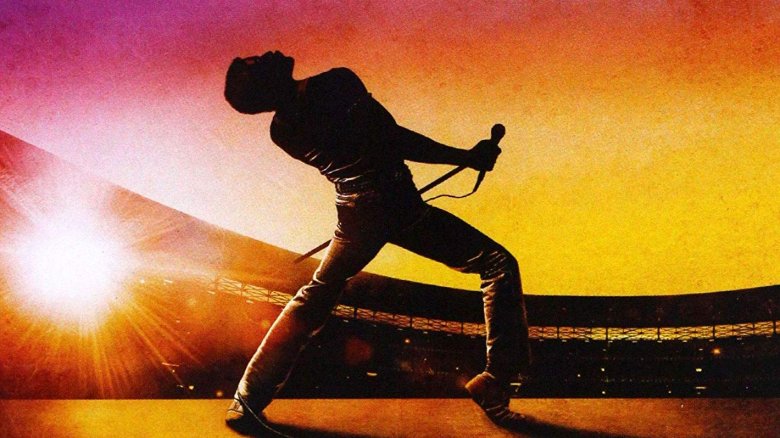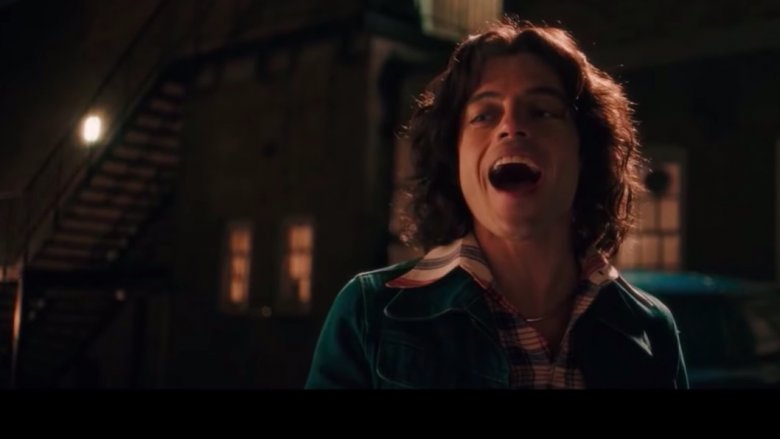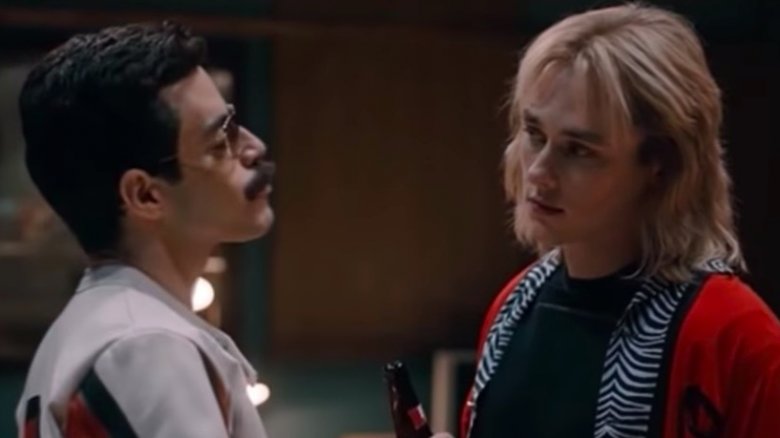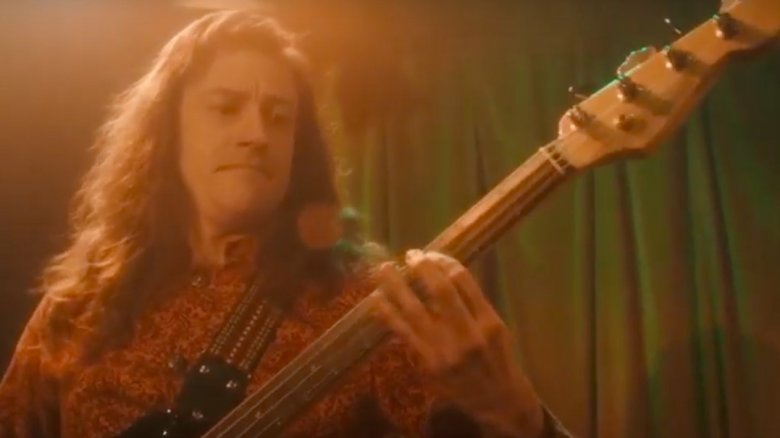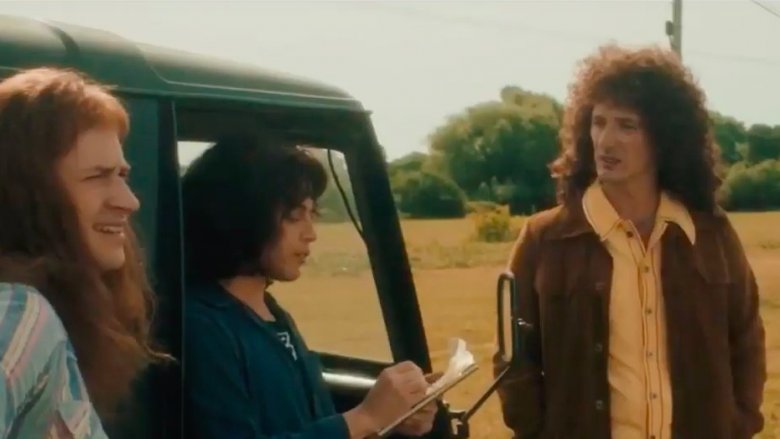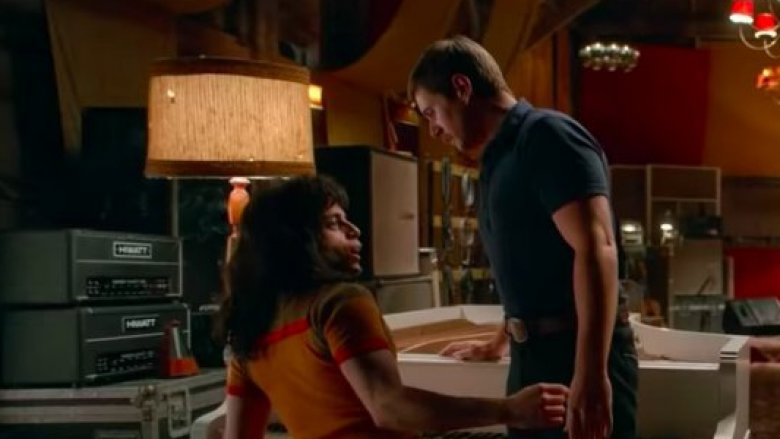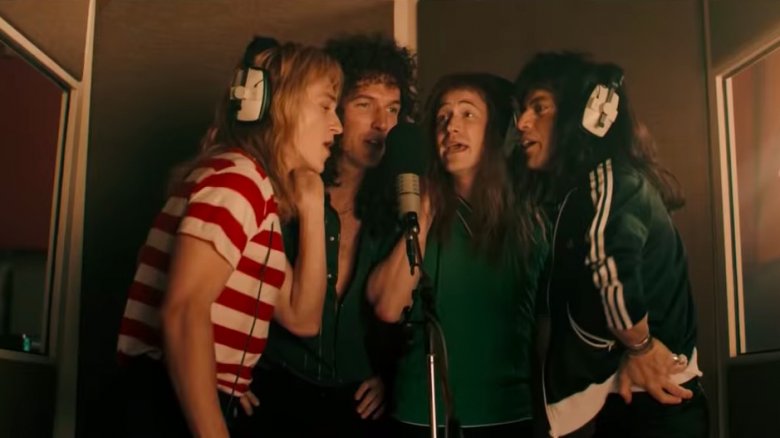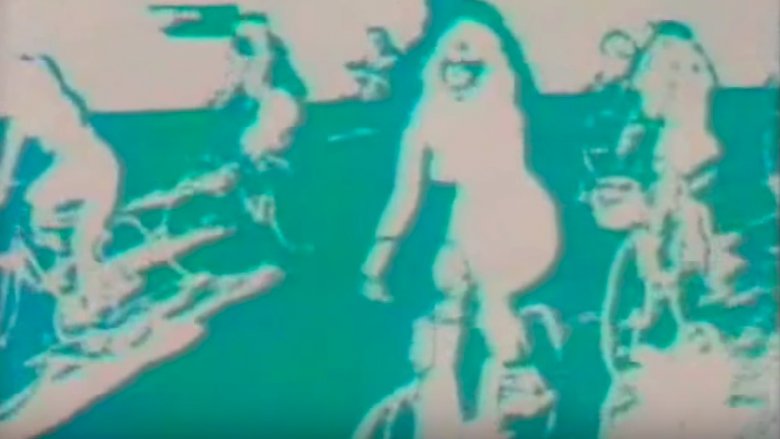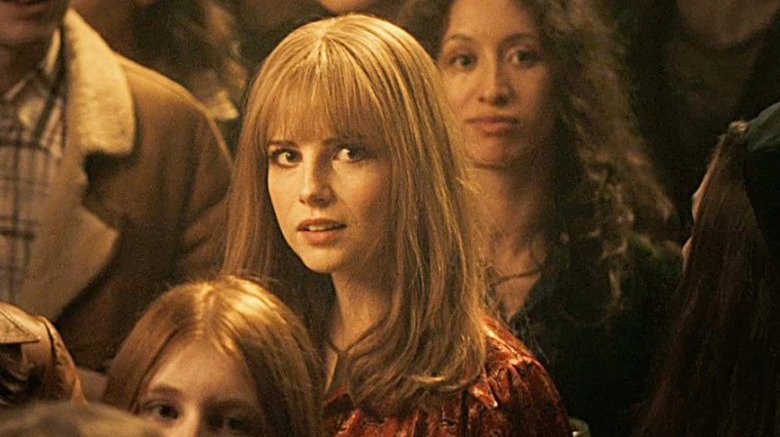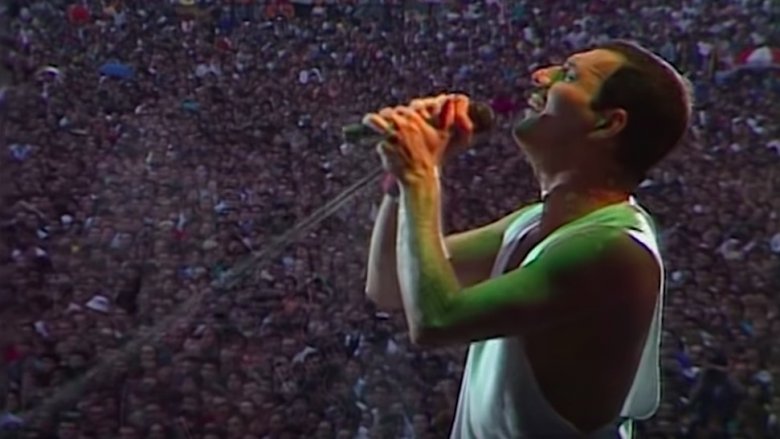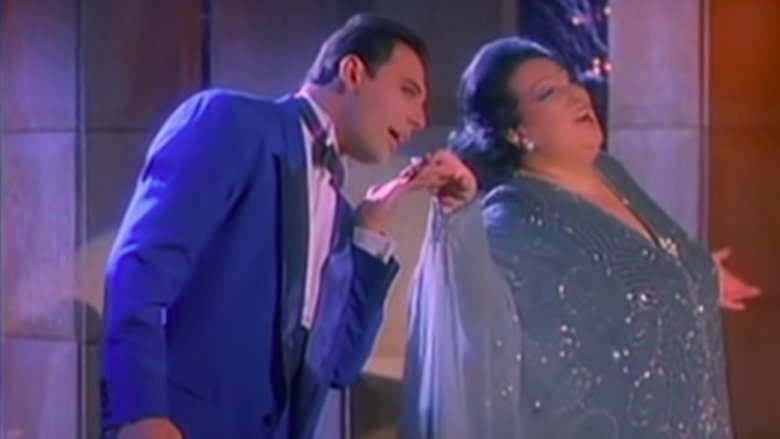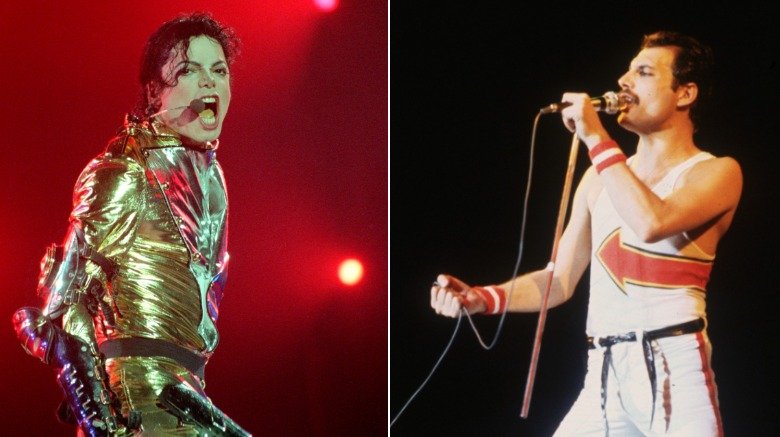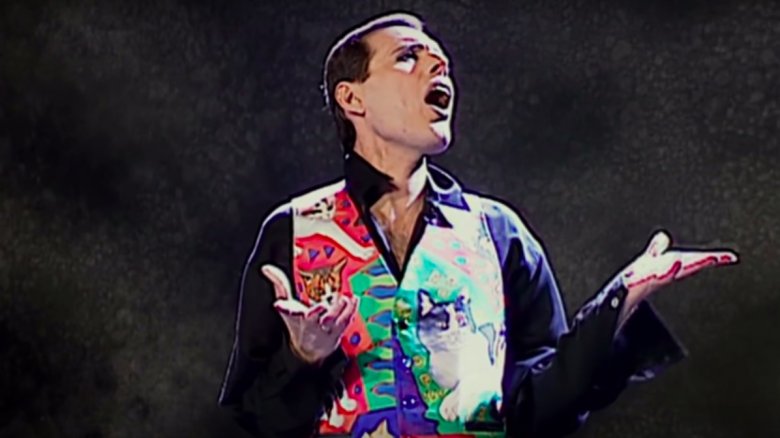How Bohemian Rhapsody Ignored Queen's True Story
To everyone who has ever complained that a biopic took too many liberties with a person's life, remember this: Human beings live for many years, and even the best movie only has a couple of hours to tell a complete story. So yes, the Queen biopic Bohemian Rhapsody told some lies. It also left some stuff out — in some cases, it left out some really big, important, epic stuff. But c'mon, if it left in all the good stuff you'd still be sitting in the theater.
If you don't know Queen's true story, though, you might be tempted to think that Bohemian Rhapsody was a tell-all, and that's simply not true. Queen was too big, too complicated, and too accomplished for 134-minute movie. So you should know all the mistruths, half-truths, and sort-of-truths, but you should also know what the movie didn't talk about at all, and how those omissions ignored some of the most important details of Queen's true story.
Freddie Mercury, Brian May, and Roger Taylor were friends before Queen
That scene where Freddie Mercury meets his future bandmates (then called "Smile") and wows them with his singing voice is cute and all, and we did so love to see Freddie stick it to the guys who just made fun of his teeth. But that's not really how it all went down. The movie leaves out the part where Freddie Mercury, Brian May, and Roger Taylor knew each other before they were all in the same band — in fact Mercury was also friends with Tim Staffell, the dude who quits the band in a huff in Bohemian Rhapsody.
The truth is there was no ugly incident preceding Staffell's departure. "My departure from Smile was completely amicable," Staffell wrote in Esquire. "Freddie and I were good friends at college. Freddie joining the band was very natural, as he was really good friends with the band members before I left and simply dovetailed in." In fact they were all part of a close-knit group of musicians who were constantly joining and quitting each other's bands. "You couldn't separate the social aspect from the musical aspect," Staffell wrote. "So we had a big pool of musical friends that would combine and recombine, trying different band ideas out. ... Freddie socialized with us ... we socialized with Freddie." And eventually, they hit on exactly the right combo, and the rest is history — just not quite as Bohemian Rhapsody tells it.
Roger Taylor and Freddie Mercury used to sell used clothes out of a market stall
It's hard to imagine Queen before they were mega-stars, but of course there was once a time before they were mega-stars. May, Taylor, and Mercury used to be bona-fide struggling musicians who had to supplement their income much like every struggling musician does. We don't see any of that in Bohemian Rhapsody, though. It might have been kind of fun, but it probably would have slowed the movie down too much.
According to Classic Rock, Mercury didn't go to college to study rock and roll. (No one does, really.) He studied graphic art and design, and he graduated in 1969. That same year, he went into business with his friend Roger Taylor. Taylor told journalist Danny Scott that the stall was in Kensington Market, "one of the hippest places in London. ... Me and Fred used to sell old Edwardian clothes and scarves that he picked up from various nefarious dealers. Back then, I didn't really know him as a singer — he was just my mate. My crazy mate! If there was fun to be had, Freddie and I were usually involved." The pair sold other stuff, too, including student artwork and Freddie Mercury's thesis, which must be worth like a bazillion dollars today. But back then they "just about managed to earn enough to keep the band ticking along," Taylor said.
John Deacon was Queen's fourth bass player
In Bohemian Rhapsody, we don't get to see how many bassists Queen went through before John Deacon finally joined the band. In the film, Deacon joins Queen almost immediately after Mercury does, but in reality it happened a lot slower than that. According to Focus On: 100 Most Popular English Songwriters, Queen's pre-Deacon bass player was too showy — he drew attention away from Freddie Mercury, which was the opposite of what the band wanted in a bass player.
But the union between Queen and Deacon wasn't exactly serendipitous, either, at least not at first. Deacon saw Queen perform in October 1970 but "was not immediately impressed," so that's kind of embarrassing. But then in early 1971 a mutual friend introduced Deacon to May and Taylor officially, and for some reason Deacon had a change of heart.
According to Ultimate Classic Rock, the band chose Deacon because he was sort of the yin to their yang, or maybe the other way around. "We were so used to each other, and so over-the-top, we thought that because he was quiet, he would fit in with us without too much upheaval," Taylor would later say. "He was a great bass player, too." Oh good, we were starting to worry there for a second that maybe his musical talent didn't have anything to do with it.
They didn't have to sell a van ... it was much, much worse than that
In the film, Queen sells their touring van so they can afford to make their first album. Shortly after that, they meet their new manager, Littlefinger ... err ... John Reid, and it's all uphill from there. But the film skipped over a ton of drama that happened before they got to that point. In real life, they didn't sell a van, they sold their souls — or so the story goes, depending of course on whose biography you read.
Their first manager was actually Norman Sheffield, co-owner of Trident Studios. According to the Guardian, after Queen's album Sheer Heart Attack made it to #2, the band was left wondering why they weren't rolling in cash. As it turns out, they'd signed a "predatory contract" with Trident, which basically said Queen would make the albums and Trident would sell them to EMI and there wouldn't be enough money left over for the band to buy a new set of drumsticks.
The band was so angry they wrote a super-unflattering ode to Sheffield called "Death on Two Legs (Dedicated to...)," and the song was merciless. It was so harsh that Brian May later said he felt bad singing it. It called Sheffield, among other things, "a sewer rat decaying in a cesspool of pride," and it angered the band's former manager so much that he decided to sue Queen and EMI for defamation of character. (It was settled out of court.)
Paul Prenter was (probably) only sort of a villain
Paul Prenter is the undisputed villain of Bohemian Rhapsody — he keeps Mercury locked away in the gilded cage of his own mansion, answers all of his calls, shuns all of his friends, and oh yeah, is probably the reason why Mercury contracted HIV. In fact the only good thing about the movie's portrayal of Paul Prenter is the part where the guy is dead so he can't be offended by any of it.
How evil Paul Prenter really was is up for debate — it is true that he sold Mercury out to the media in 1987, so he did at least have some villainous tendencies. But the movie leaves out a lot of the things that Mercury did with Prenter and with like a million other people, too.
Mercury did not spend all his time in his home waiting for Prenter to bring the party to him. He had an entourage of people, and he spent a lot of time with them at nightclubs and parties. According to the Guardian, Mercury regularly had himself a real good time at the legendary London nightclub Heaven. His entourage included not just Paul Prenter, but (at various times) Peter Straker, Elton John, and Princess Diana. We don't see any of that, though, because it would have jumbled the narrative and turned Prenter into a more watered-down villain. And at some point in every film, we all need to find somebody to hate.
Bohemian Rhapsody was even more of a production than it was in the film
"Bohemian Rhapsody" was Queen's crowning achievement — they did great stuff afterward, but nothing would ever quite match the epic scale of the six-minute half-opera, half-rock suite that the film was named for. And like nearly all great works of art, "Bohemian Rhapsody" didn't come together during a few days in a recording studio.
In the film, we see Mercury tapping out the first notes on his piano, but we don't see any of the flashes of inspiration that came before all that. According to Rock Music Revival, Mercury started writing "Bohemian Rhapsody" in college — the famous opening words, "Mama, just killed a man" were the first to come to mind, and led Mercury to think of it as "The Cowboy Song," which makes a weird kind of sense if the first few stanzas are all you have to go on.
The band started working on the song together in 1975. The operatic sessions took 70 hours to record and happened not just in that one studio in the muddy middle of nowhere, but in five different studios — and that was just for the vocals. Most of Queen's contemporaries reacted exactly the way Mike Meyer's fictional character did. "What the f*** is this?" exclaimed EMI's general manager of sales when he first heard the track. But Queen wouldn't back down, the song remained uncut, and music history was forever grateful.
That whole weird naked women on bikes thing
Queen was never afraid of controversy, and one of the most controversial things they ever did was put a bunch of naked women on bicycles and film them. There's nothing about this in the film, not even a hint, because it's an amusing aside but it would have totally derailed the story they were trying to tell.
According to Pop Expresso, the promotional video for "Bicycle Race" — a song that doesn't appear in Bohemian Rhapsody — featured 65 female professional models racing bicycles at Wimbledon Greyhound Stadium in the U.K. Queen rented all the bikes used in the video, but when the rental place found out what they were doing with them, they requested that the band actually purchase all the seats, because otherwise eww.
Queen knew the video would be controversial, and it was — it got tons of press and the requisite outrage. The video was banned and then re-edited with some special effects magic to obscure the naughty bits, and the album, Jazz, reached #2 on the U.K. charts and #6 in the U.S. It was marketing genius, really.
Mary Austin was not Mercury's only heterosexual relationship
In the movie, Mary Austin tells Mercury he's gay, and at that point the movie continues with a portrayal of Mercury as only interested in men. This was probably mostly a concession to the fact that a lot of humans can't get their heads around the idea that a person can like both men and women, though it certainly simplified the narrative.
But Mercury was a lot more complicated than that. The truth is that he did not just go on to have relationships with men alone, but also with women, and the film just handily excluded all of the latter so we wouldn't have to process what that actually meant.
According to Biography, Mercury had a number of relationships with men, including Jim Hutton, who does have a part in Bohemian Rhapsody. During the 1980s, though, he also had a relationship with German actress Barbara Valentin — the two met in Munich and even shared an apartment, although she would later describe him as "mostly gay." Her presence in the film would have been way too much of a segue from the story's trajectory, though, so filmmakers instead opted to let viewers believe that Mercury was just gay, full stop.
Queen played in South Africa back when playing in South Africa was Not Cool
Apartheid South Africa was, for the most part, dismantled in the early 1990s, but in the 1980s it was still an important political and social issue. Black people in South Africa suffered under a strict system of racial segregation, which impacted pretty much every part of their lives, from what public facilities they could use to where they could live and work. And loads of people outside of South Africa were outspoken about the cruelty and injustice of the apartheid system, from politicians to Queen's own contemporaries in the music industry.
So why Queen chose to play in South Africa is baffling. According to the Guardian, there was a United Nations cultural boycott in place, and yet they played a run of shows at Sun City in Bophuthatswana. Brian May excused the move, saying it didn't matter since Queen was "not political — we play to anybody who wants to come and listen."
It damaged their reputation to the point where they were not invited to participate in the "Band Aid" charity recording in 1984. Mercury was so injured by the exclusion that he had to be coaxed into agreeing to play at Live Aid. And that means in Bohemian Rhapsody, filmmakers fabricated most of the drama leading up to the Live Aid performance. It wasn't friction within the band that caused the Live Aid set to nearly not happen; it was friction between Mercury and everyone else.
Freddie Mercury did some ballet and some opera, too
In the film, Freddie Mercury had a single musical pursuit — Queen, with a short side track for some solo stuff. In reality, Mercury collaborated with a lot of other stars, including a famous opera singer named Montserrat Caballe. According to El Pais, Mercury met Caballe in 1987, and their creative union produced one of the world's most influential marriages of classical and contemporary music, the anthem "Barcelona."
That's probably not especially shocking, though, since we've known about Mercury's fondness for opera since "Bohemian Rhapsody" (the song). What might surprise you even more is that Mercury also performed with the Royal Ballet, though he did require a little bit of convincing before agreeing to take part. "I thought they were mad," he said, but after speaking to the head of EMI (who was also chairman of the Royal Ballet's board of governors), he decided to give it a go.
You don't become a ballet dancer overnight, though, and Mercury later recalled the punishing training in the London Evening News. "It was murder," he said. "After two days I was in agony. It was hurting me in places I didn't know I had, dear." He made his debut in October 1979 before an audience of 2,500 theater patrons. "I wasn't quite Baryshnikov, but it wasn't bad for an aging beginner. I'd like to see Mick Jagger or Rod Stewart try that!"
Mercury collaborated with a number of big stars
Bohemian Rhapsody doesn't touch on any of Mercury's other musical collaborations, either, or the friendships he forged with some of the greatest musicians of his time. We know he was acquainted with David Bowie because the iconic song "Under Pressure" came directly out of that relationship. Mercury's relationship with David Bowie went all the way back to his college years, when Bowie played a gig at Mercury's university, and Mercury helped him push a bunch of desks together to make a stage.
But Mercury recorded with other big names, too, including Michael Jackson. According to Strut, in 1983, the pair worked together on the songs "There Must be More to Life than this," "State of Shock," and "Victory," but the songs were never released. Why? Because of a llama.
If we weren't talking about Michael Jackson, you would be surprised, but you're not of course because it's Michael Jackson. Yes, the recording sessions were interrupted by Jackson's pet llama, and Mercury couldn't take it, finally calling manager Jim Beach and begging to be rescued: "You've got to get me out of here. I'm recording with a llama. ... I've had enough and I want to get out."
Freddie Mercury kept recording until the last few months of his life
Freddie Mercury's decline was slow and private. We see none of it in Bohemian Rhapsody because producers decided to give the film a triumphant ending rather than a tragic one. In real life, Mercury's AIDS diagnosis didn't come until two years after the iconic Live Aid performance, and he lived for another four years after that.
When Mercury appeared with Queen at the 1990 Brit Awards, he was gaunt and pale, and he said little, just "Thank you, goodnight." Out of the public eye, though, Mercury kept working. "Freddie wanted his life to be as normal as possible," Brian May later said. "For him the studio was an oasis, a place where life was just the same as it always had been. He loved making music. He lived for it."
In fact according to the Telegraph, Mercury kept recording until he could no longer do it — his last session was in May 1991, and his last song was "Mother Love," recorded between the 13th and the 16th of that month. But at that point in his life, he was very sick. "We got as far as the penultimate verse and he said, 'I'm not feeling that great ... I'll finish it when I come back, next time.' But of course, he didn't ever come back to the studio after that."
Mercury died in November of that same year, and Brian May sang the last verse of "Mother Love."
